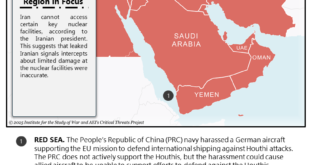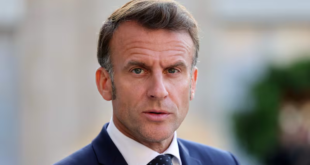U.S. President Donald Trump’s top Asia adviser deployed fluent Chinese Monday in a speech chastising China’s rulers for thwarting their people’s century-long quest for democracy–likening censored coronavirus doctors and Hong Kong protesters to key figures in “a long-running struggle for the soul of modern China.”
Deputy National Security Adviser Matt Pottinger used the anniversary of the May 4, 1919 protests–which were sparked by popular anger at the concession of a huge tract of Chinese territory to Japan after World War Two–to raise concerns about Chinese repression and nationalism and to laud persecuted foes of Beijing.
“The movement ignited by those students exactly 101 years ago was about much more than nationalist outrage at ‘unequal treaties,'” said Pottinger.
“The movement galvanized a long-running struggle for the soul of modern China,” he said, as he gave a brief summary of what he called “heroes” in the modernization of China after the last dynasty fell in 1911.
Without touching on the specifics of thorny U.S.-China disputes over issues such as the origin and handling of the coronavirus pandemic, trade or geopolitics, Pottinger highlighted similarities between the Communist Party and authorities 100 years earlier in their response to democratic demands and reformist citizens.
“Such elitist chauvinism was–and some would argue still remains–a headwind impeding the democratic ideals espoused by the May Fourth Movement,” said the former foreign correspondent in Beijing and U.S. Marine Corps veteran who served in Afghanistan and Iraq.
“Still, May Fourth leaders were constantly sapped of energy by accusations, sometimes leveled by government officials or their proxies among the literati, that the movement was slavishly pro-Western, insufficiently Chinese, or even unpatriotic,” said Pottinger.
Democratic Taiwan refutes ‘threadbare mistruth’
He noted that a Chinese diplomat named P.C. Chang (Peng Chun Chang) served on the original UN Commission on Human Rights and played an important role in its drafting of the Universal Declaration of Human Rights in 1948, a year before the Republic of China that Chang represented was overthrown by Mao Zedong’s communists.
Pottinger noted that Chang drew on Chinese traditions in his contributions to the main U.N. human rights instrument and said his example, as well as that of Taiwan’s thriving democracy, undermine China’s assertion that democracy is not suitable for the Chinese people.
“The cliché that Chinese people can’t be trusted with democracy was … the most unpatriotic idea of all. Taiwan today is a living repudiation of that threadbare mistruth,” he said.
Pottinger, who spoke from the White House to an online symposium on U.S.-China relations organized by the University of Virginia, praised present-day figures who have faced Communist Party repression.
“The heirs of May Fourth are civic-minded citizens who commit small acts of bravery. And sometimes big acts of bravery,” he said.
Wuhan whistleblower doctor Li Wenliang, who was silenced after posting early warnings about the coronavirus and later died of COVID-19, “was such a person,” he said.
“He was an ophthalmologist and a young father who committed a small act of bravery and then a big act of bravery,” said Pottinger.
‘Moral and physical courage’
Li, an ophthalmologist at Wuhan Central Hospital, had shared information from a patient’s medical records in a WeChat group on Dec. 30, showing signs of infection with a SARS-like coronavirus.
Detained and reprimanded by police on Jan. 3 for spreading rumors, Li was among eight people to be detained and questioned in Wuhan over “rumor-mongering” around the new disease. He died in early February and was exonerated in late March.
“Dr. Li’s comment to a reporter from his deathbed still rings in our ears: ‘I think there should be more than one voice in a healthy society, and I don’t approve of using public power for excessive interference,'” said Pottinger.
Pottinger, who reported from Beijing for Reuters news agency and The Wall Street Journal, lamented tightening media and free speech restrictions under the tenure of Chinese Communist Party head Xi Jinping.
“Citizen journalists who tried to shed light on the outbreak in Wuhan went missing, including Chen Qiushi, Fang Bin and Li Zehua,” he said, referring to Wuhan residents who challenged censorship to publish real-time news.
“More foreign reporters were expelled in recent months than the Soviet Union expelled over decades,” he added in reference to 13 U.S. journalists Beijing kicked out of the country in March.
Pottinger also hailed “big acts of moral and physical courage” by a list of jailed activists, intellectuals and critics of Xi including Xu Zhangrun, Ren Zhiqiang, Xu Zhiyong, and Ilham Tohti.
Those figures, underground Catholic priests, and “millions of Hong Kong citizens who peacefully demonstrated for the rule of law last year,” are the successors of the May Fourth Movement heroes, Pottinger told the video conference.
“Will the movement’s democratic aspirations remain unfulfilled for another century? Will its core ideas be deleted or distorted through official censorship and disinformation? Will its champions be slandered as ‘unpatriotic,’ ‘pro-American, ‘subversive’?” he asked.
“We know the Communist Party will do its best to make it so.”
Chinese writer Murong Xuecun, a prominent critic of censorship in his country, told RFA’s Mandarin Service that after the May Fourth Movement, China was still on the difficult path of pursuing democracy and science “and we have not made much progress.”
“In recent years, China’s position in the world economic and trade system has become more and more important, but at home, the heirs to the May 4th spirit who are determined to pursue democracy face increasing difficulty, and Western countries seem to have lost their enthusiasm for the democratic cause for China.”
“By clearly showing that he cares about China’s democratic cause, I believe Pottinger will certainly inspire many people,” said Murong Xuecun.
 Eurasia Press & News
Eurasia Press & News


